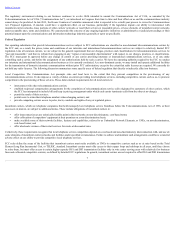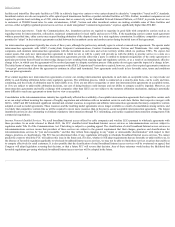Earthlink 2015 Annual Report Download - page 20
Download and view the complete annual report
Please find page 20 of the 2015 Earthlink annual report below. You can navigate through the pages in the report by either clicking on the pages listed below, or by using the keyword search tool below to find specific information within the annual report.
Table of Contents
Decisions by legislative or regulatory authorities, including the Federal Communications Commission, relieving incumbent carriers of certain regulatory
requirements, and possible further deregulation in the future, may restrict our ability to provide services and may increase the costs we incur to provide these
services.
We rely in significant part on purchasing wholesale services, including special access services, interconnection to exchange traffic with incumbent and other
carriers, and leasing network facilities from AT&T, CenturyLink, Verizon and other incumbent carriers. Over the past several years, the Federal Communications
Commission (“FCC”) has reduced or eliminated a number of regulations governing the incumbent carriers' offerings, which has had the effect of reducing these
carriers' competition-related obligations. These FCC actions include removal of local switching and other network elements from the list of elements that the
incumbent carriers must provide on an unbundled basis at TELRIC cost-based rates, the grant of broad pricing flexibility to incumbents for their special access
services in many areas, and the nationwide deregulation of certain services including optical carrier transmission and packet-switched services. If the FCC
continues to reduce or eliminate regulations governing incumbent carriers, and if the incumbent carriers do not continue to permit us to purchase these services
from them under commercial arrangements at reasonable rates, our business could be adversely affected and our cost of providing local service could increase. This
can have a significant adverse impact on our results of operations and cash flows.
The incumbent carriers regularly attempt to further reduce their competition-related obligations to non-incumbent carriers like us. In November 2012, AT&T filed
a petition with the FCC requesting that the FCC open a proceeding “to facilitate… the transition” from technology platforms such as copper loops to IP-based
platforms, which proceeding could have the effect of further reducing the local competition-related obligations of the incumbent carriers. The FCC has also
established a task force to coordinate its efforts on IP interconnection. Likewise, certain states have taken steps to address IP interconnection. In addition, certain
incumbent LECs have expressed an intention to begin discontinuing DS1 and DS3 special access services or at least certain term plans that provide us with
discounts on these services. However, in August 2015, the FCC adopted a requirement that for an ILEC to receive authority to discontinue, reduce, or impair a
legacy service that is used as a wholesale input by competitive providers, the ILEC must commit to providing competitive carriers “reasonably comparable”
wholesale access on “reasonably comparable” rates, terms, and conditions. This requirement expires upon the resolution of the FCC’s pending review of the special
access market. We cannot predict how the FCC will interpret the “reasonably comparable” standard or how application of that standard will affect our ability to
obtain sufficient wholesale inputs from in the incumbent LECs in the future
If the FCC, Congress, state legislatures or state regulatory agencies were to adopt measures reducing the local competition-related obligations of the incumbents or
allowing those carriers to increase the rates we must pay, we could experience additional increases in operating costs that would negatively affect our operating
results and cash flows. In addition, the FCC currently is considering whether and how to reform its special access rules. We rely to a considerable extent on
interstate special access services purchased from the incumbent carriers in order to connect to our customers. If the FCC adopts rules that do not protect our ability
to purchase these services at reasonable prices on non-discriminatory terms as compared to our competitors, our business could be adversely affected.
If we are unable to interconnect with AT&T, Verizon and other incumbent carriers on acceptable terms, our ability to offer competitively priced local telephone
services will be adversely affected.
To provide local telephone services, we must interconnect with and resell the services of the incumbent carriers to supplement our own network facilities, pursuant
to interconnection agreements between us and the incumbent carriers. We operate under interconnection agreements with AT&T, CenturyLink, Fairpoint
Communications, Frontier Communications, Verizon and Windstream. An interconnection agreement typically has a term of three years, although the parties may
mutually agree to extend or amend such agreements. Federal law requires these carriers to negotiate the terms of interconnection agreements with us in good faith,
but if such negotiations are unsuccessful we may be forced into an expensive arbitration proceeding before state PUCs, with an uncertain outcome. If we are not
able to renegotiate or enter into interconnection agreements on acceptable terms, or if we are subject to unfavorable arbitration decisions, our cost of doing business
could increase and our ability to compete could be impeded. Moreover, our interconnection agreements and traffic exchange agreements with companies other than
ILECs (such as wireless and VoIP providers and other competitive carriers) are not subject to the statutory arbitration mechanism, making it potentially more
difficult to reach any agreement on terms that we view as acceptable. If we are unable to enter into, maintain, or update favorable interconnection agreements in
our markets, our ability to provide local services on a competitive and profitable basis may be adversely affected. Any successful effort by the incumbent carriers
to deny or substantially limit our access to their network elements or wholesale services (in commercial agreements or by regulatory petition or otherwise) also
would harm our ability to provide local telephone services.
17
























